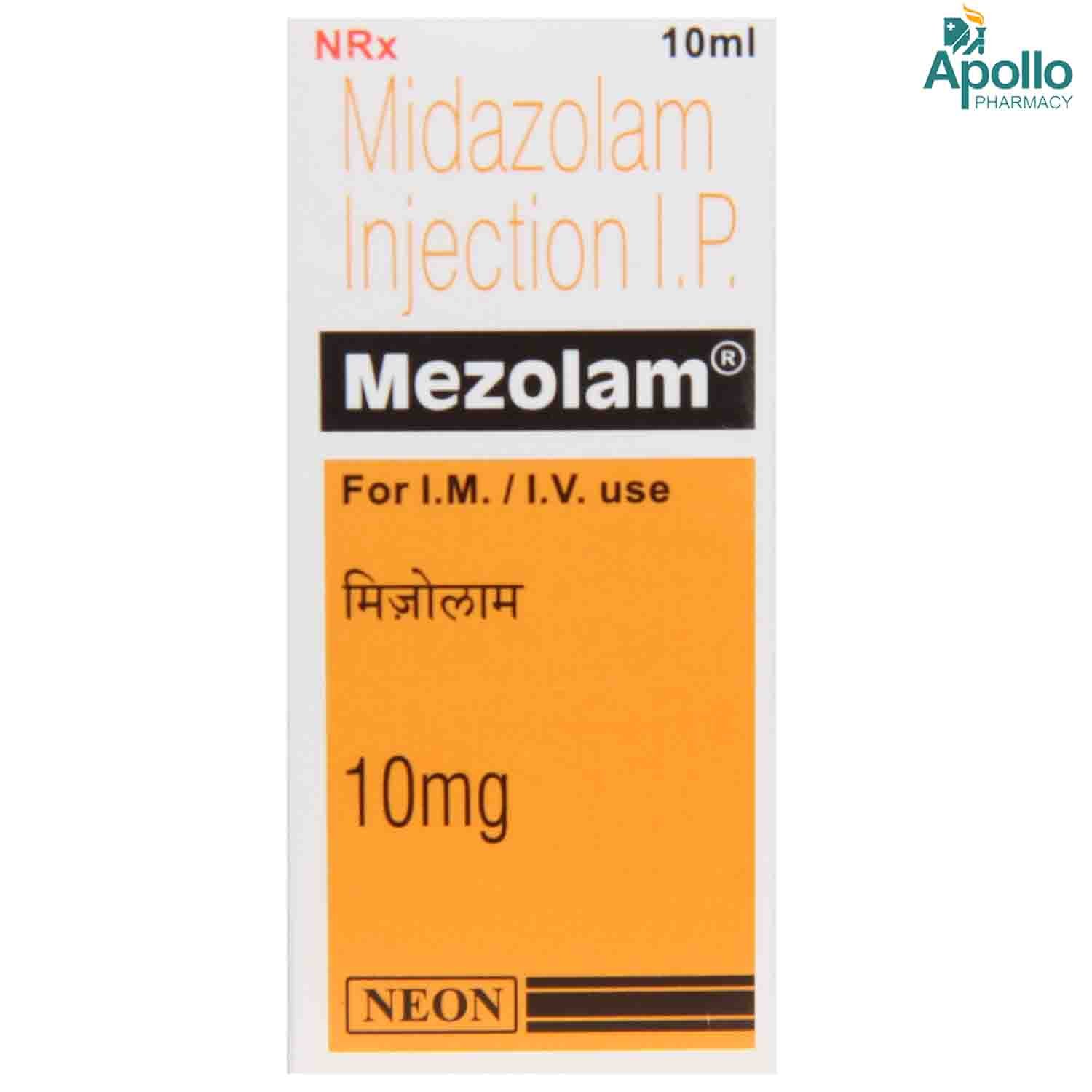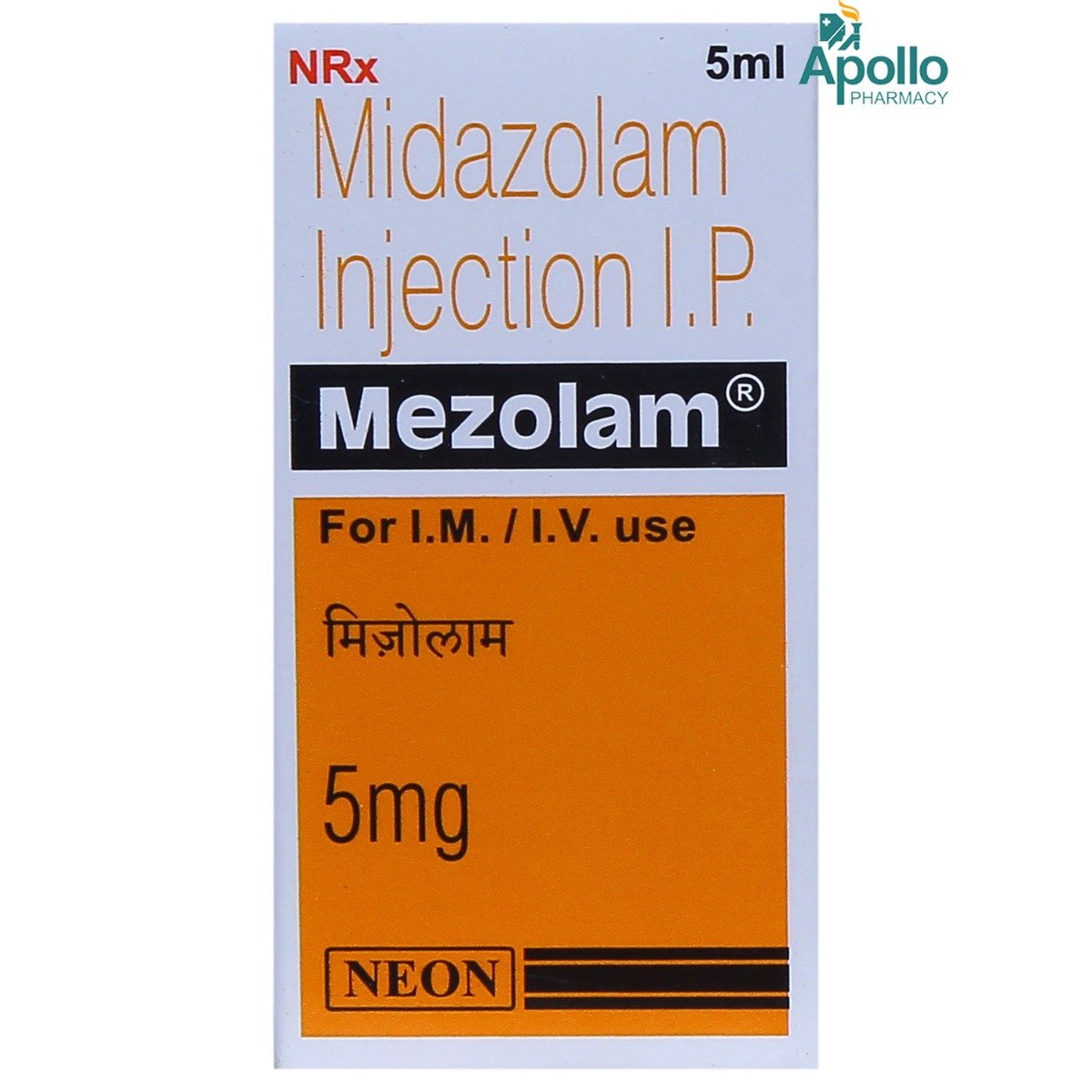MEDZOL INJECTION 5ML
MRP ₹31.5
(Inclusive of all Taxes)
₹4.7 Cashback (15%)
Provide Delivery Location
Online payment accepted
 Prescription drug
Prescription drugWhats That
Composition :
Manufacturer/Marketer :
Consume Type :
Expires on or after :
Return Policy :
About MEDZOL INJECTION 5ML
MEDZOL INJECTION 5ML belongs to a class of drugs called benzodiazepines (sedatives) used to induce sedation and relieve anxiety and muscle tension. It is used to induce sleepiness during therapeutic procedures (like endoscopy or colonoscopy) or complicated medical tests known as procedural sedation. Conscious sedation is a technique in which drugs help you relax (sedative), reduce anxiety and inhibit pain (anaesthetic) during a medical test or procedure. It is usually referred to as procedural sedation and analgesia.
MEDZOL INJECTION 5ML contains Midazolam which works by increasing GABA activity (a chemical messenger in the brain that acts as a natural nerve-calming agent) involved in inducing drowsiness. Thereby, MEDZOL INJECTION 5ML relaxes muscles, reduces anxiety and causes drowsiness.
MEDZOL INJECTION 5ML will be administered by a healthcare professional; do not self-administer. Sometimes, it may cause side effects such as redness, pain or swelling at the injection site, headache, drowsiness, dizziness, confusion, dry mouth, tiredness or muscle spasms. Most of these side effects do not require medical attention and gradually resolve over time. However, if the side effects persist or worsen, please consult your doctor.
If you are allergic to Midazolam or any other medicines, please tell your doctor. If you are pregnant or planning pregnancy, inform your doctor before taking MEDZOL INJECTION 5ML. It may be excreted in breast milk. Therefore, avoid breastfeeding for 24 hours after taking MEDZOL INJECTION 5ML. MEDZOL INJECTION 5ML should be used with caution in elderly patients as there is an increased risk of breaking bones and falling. Special care should be taken while treating children with MEDZOL INJECTION 5ML. Avoid consumption of alcohol while on treatment with MEDZOL INJECTION 5ML as it may increase the sedative effect. MEDZOL INJECTION 5ML may cause drowsiness or affect concentration and coordination. It is an offence to drive if MEDZOL INJECTION 5ML affects you. Therefore, avoid driving if you feel drowsy after taking MEDZOL INJECTION 5ML.
Uses of MEDZOL INJECTION 5ML
Directions for Use
Key Benefits
MEDZOL INJECTION 5ML contains Midazolam used to induce conscious sedation (awake but very relaxed state of calm or drowsiness) during therapeutic procedures or medical tests. MEDZOL INJECTION 5ML increases the activity of GABA (a chemical messenger in the brain that acts as a natural nerve-calming agent) that is involved in inducing drowsiness. Thereby, MEDZOL INJECTION 5ML relaxes muscles, reduces anxiety and causes drowsiness.
Storage
Drug Warnings
If you are allergic to Midazolam or any other medicines, please inform your doctor. If you are pregnant or planning pregnancy, inform your doctor before taking MEDZOL INJECTION 5ML. MEDZOL INJECTION 5ML may be excreted in breast milk. Therefore, avoid breastfeeding for 24 hours after taking MEDZOL INJECTION 5ML. MEDZOL INJECTION 5ML should be used with caution in elderly patients as there is an increased risk of breaking bones and falling. Special care should be taken while giving MEDZOL INJECTION 5ML to children, and the dose should be adjusted appropriately. Avoid consumption of alcohol with MEDZOL INJECTION 5ML as it may increase the sedative effect of MEDZOL INJECTION 5ML. MEDZOL INJECTION 5ML may cause drowsiness or affect concentration and coordination. It is an offence to drive if MEDZOL INJECTION 5ML affects you. Therefore, avoid driving if you feel drowsy after taking MEDZOL INJECTION 5ML. Do not take MEDZOL INJECTION 5ML with opioids as it may increase the risk of difficulties in breathing, drowsiness or coma. However, if the concomitant use is advised by a doctor, the dose and duration should be limited by a doctor.
Diet & Lifestyle Advise
Side Effects of MEDZOL INJECTION 5ML
- Redness, pain or swelling at the injection site
- Headache
- Drowsiness
- Dizziness
- Confusion
- Dry mouth
- Tiredness
- Muscle spasms
Habit Forming
Therapeutic Class
All Substitutes & Brand Comparisons
RX
Out of StockNot for online saleBENZOSED INJECTION 5ML
Troikaa Pharmaceuticals Ltd
₹30.5
(₹5.36/ 1ml)
5% CHEAPERRX
Not for online saleMEDZOL INJECTION 10ML
Themis Chemicals Ltd
₹62
(₹5.58/ 1ml)
1% CHEAPER
Author Details
We provide you with authentic, trustworthy and relevant information
FAQs
Drug-Drug Interactions Checker List
- DILTIAZEM
- NIFEDIPINE
- VERAPAMIL
- FLUCONAZOLE
- KETOCONAZOLE
- VORICONAZOLE
- ITRACONAZOLE
- POSACONAZOLE
- CLARITHROMYCIN
- ERYTHROMYCIN
- ROXITHROMYCIN
- RIFAMPICIN
- ATORVASTATIN
- SAQUINAVIR
- PHENYTOIN
- CARBAMAZEPINE
- FENTANYL
- DIAZEPAM
Special Advise
If you receive MEDZOL INJECTION 5ML for prolonged periods, it may cause dependence and withdrawal symptoms. Therefore, do not stop taking MEDZOL INJECTION 5ML suddenly. Your doctor will reduce the dose gradually to avoid withdrawal symptoms.
Disease/Condition Glossary
Conscious sedation: It is a technique in which drugs help you relax (sedative), reduce anxiety and inhibit pain (anaesthetic) during a medical test or procedure. You will stay awake but may not be able to speak. It is usually referred to as procedural sedation and analgesia.

Have a query?
Alcohol
Safe if prescribed
Avoid consumption of alcohol with MEDZOL INJECTION 5ML as it may increase the sedative effect of MEDZOL INJECTION 5ML and may also cause breathing problems.
Pregnancy
Consult your doctor
If you are pregnant or planning for pregnancy, inform your doctor before taking MEDZOL INJECTION 5ML. However, if MEDZOL INJECTION 5ML is used for prolonged treatment during the last trimester, it may cause physical dependence and risk of withdrawal symptoms after birth in the baby.
Breast Feeding
Consult your doctor
MEDZOL INJECTION 5ML may be excreted in breast milk. Therefore, avoid breastfeeding for 24 hours after taking MEDZOL INJECTION 5ML.
Driving
Safe if prescribed
MEDZOL INJECTION 5ML may cause drowsiness or affect concentration and coordination. It is an offence to drive after taking MEDZOL INJECTION 5ML and if it affects your ability to drive. Therefore, avoid driving if you feel drowsy after taking MEDZOL INJECTION 5ML.
Liver
Consult your doctor
If you have liver conditions, inform your doctor before taking MEDZOL INJECTION 5ML.
Kidney
Consult your doctor
If you have kidney problems, inform your doctor before taking MEDZOL INJECTION 5ML.
Children
Safe if prescribed
If your child has a heart condition, notify your doctor before giving MEDZOL INJECTION 5ML. The dose will be adjusted specifically, and your child will be closely watched. MEDZOL INJECTION 5ML is only advised for sedation in intensive care units for newborns and babies under six months of age, and their breathing and oxygen levels must be closely monitored.










